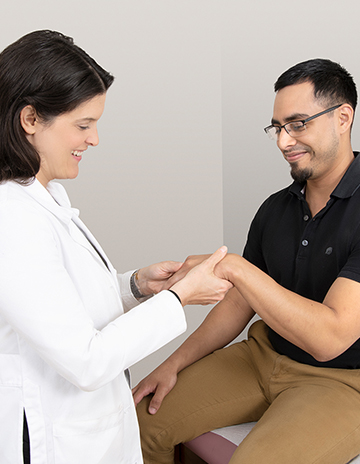EFFECTIVE MANAGEMENT OF OSTEOARTHRITIS FOR PATIENTS IN NEW JERSEY
Right where you need it.
For decades, the rheumatologists at Arthritis, Rheumatic & Back Disease Associates (ARBDA), have helped patients enjoy active lives even with a diagnosis of osteoporosis. Since this disorder most often affects older individuals, ARDBA rheumatologists are also expert in helping patients manage their osteoporosis while dealing with other health issues that may occur at the same time.
Patients can find this exceptional level of advanced osteoporosis care at six convenient locations throughout Southern New Jersey. Right in the communities where they live and work.
Osteoarthritis: Damage To The Joints We Use Most
Think of the knee as a feat of incredible engineering: It’s an intricate, hinge-like structure that allows us to walk, sit, and bend.
When someone develops osteoarthritis, the cushioned cartilage protecting the bones of the knee — meant to enable smooth motion — begins to deteriorate over time. As we lose this cartilage, symptoms like pain, stiffness, inflexibility, and swelling begin and can get worse over time.
As you might expect, the most common sites for osteoarthritis to occur are the joints we use most: Joints in the neck, knees, hips, shoulders, and especially in the knees and knuckles.

What are the symptoms of osteoarthritis?
Have you ever heard a cracking or grinding sound in your knees? How about stiffness, swelling, and the feeling that you can’t move around like you used to? All of these can be symptoms of osteoarthritis.
For better or worse, osteoarthritis is generally a consequence of living longer. As osteoarthritis progresses, damage to the cartilage can also compromise how the muscles, ligaments, and bones function. In the advanced stages of osteoarthritis, bones can rub against each other – causing severe, often life-changing symptoms. That’s why the management of osteoarthritis is so crucial.
Who develops osteoarthritis?
Many people often confuse rheumatoid arthritis and osteoarthritis. This is one of the questions that we are asked most often. Simply put — unlike rheumatoid arthritis, which develops because the immune system is not working correctly – osteoarthritis is caused by many factors, most of which are related to daily life. Rheumatoid arthritis treatment methods will differ from osteoarthritis remedies. That said, a leading factor which can make osteoarthritis worse is obesity: When the knees, shoulders, and hips carry extra weight over a long period of time – the constant increased pressure can damage joints, making the management of osteoarthritis a more painful and difficult task over time.
In addition to normal aging, athletes and weekend warriors may develop osteoarthritis earlier than others because of the increased stress and injury that come with these types of activities. Moreover, someone whose work demands continual heavy lifting may suffer from joint injury due to overuse.
Genetics may also play a role in whether someone develops osteoarthritis: For example, if a parent had “bad knees” due to osteoarthritis, there may be a genetic propensity for their children to develop similar problems as they age into adulthood.
Osteoarthritis Diagnosis - How it Works
Your ARBDA Rheumatologist is specially trained to evaluate joint problems. They will take a detailed family/medical history and perform a thorough physical exam. Imaging studies (such as an X-Ray, Ultrasound, or MRI) may be necessary to provide a clearer picture of the extent of joint damage. Should you have excess fluid in the painful joint(s) – your osteoarthritis doctor may extract and analyze it to distinguish osteoarthritis from other types of arthritis.
What is osteoarthritis treatment, and how does it work?
You might be wondering, “what is osteoarthritis treatment?” Luckily, there are many medical treatments available for osteoarthritis. Partnering with your ARBDA osteoarthritis doctor to decipher what treatment works best for you is the best first step. Having frequent communication and a willingness to adapt to changes in your lifestyle are integral to the management of osteoarthritis, ensuring that you can live to your fullest potential.
A great first step in helping to achieve pain relief is to lose weight (if appropriate). Your osteoarthritis doctor may discuss how physical therapy, occupational therapy, and/or hydrotherapy (also called, “Aqua Therapy”) could help with the management of osteoarthritis by re-training and strengthening different muscle groups.
For knee treatment, specifically, there is an injection therapy (called viscosupplementation) which can replace some of the specific fluid that’s lost over time. This single injection, performed by your osteoarthritis doctor, can provide pain relief for up to six months, and is often regarded as one of the more effective knee treatment options for osteoarthritis patients.
Some medical treatments for osteoarthritis target inflammation throughout the body and can be used in conjunction with other therapies to reduce pain in the neck, knees, and other joints. This is similar to the treatment methods used in psoriatic arthritis management, although not exactly the same. Your ARBDA rheumatologist will help you explore all of your options for the management of osteoarthritis.
Learn More About ARBDA Treatments for Severe Osteoarthritis in New Jersey
Your ARBDA osteoarthritis doctor is an expert guide to determine the best solution for each unique individual. Contact us or visit one of our offices in New Jersey to inquire about osteoarthritis diagnosis, or to learn more about treatment options for severe osteoarthritis. We also have lupus specialists in house, in addition to osteoporosis treatment options and other solutions for a wide range of autoimmune conditions.

